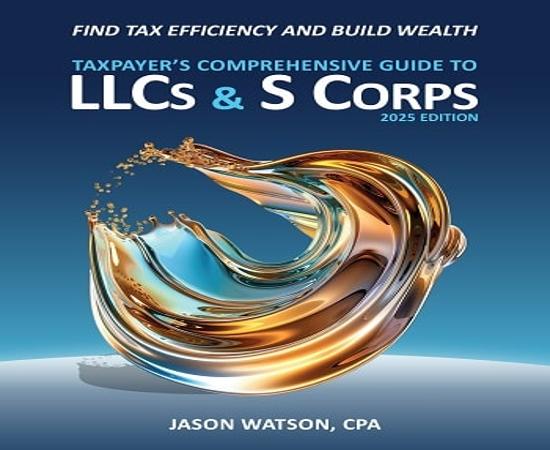Taxpayer’s Comprehensive Guide to LLCs and S Corps: A Complete Overview
Are you considering starting a business but unsure about which entity structure to choose for tax purposes? The Taxpayer’s Comprehensive Guide to LLCs and S Corps by Jason Watson is a valuable resource that can help you navigate through the complexities of tax planning for your business.
Benefits of Using the taxpayer’s comprehensive guide
One of the key benefits of the taxpayer’s comprehensive guide is that it provides clear and concise explanations of how LLCs and S Corps work, their tax implications, and the pros and cons of each entity type. By using this guide, you can make informed decisions about which structure best suits your business goals and tax situation.
Understanding LLCs and S Corps
LLCs (Limited Liability Companies) and S Corps (S Corporations) are popular choices for small businesses due to their flexibility and tax advantages. LLCs offer limited liability protection for business owners and pass-through taxation, while S Corps allow for the same pass-through taxation benefits along with potential tax savings on self-employment taxes.
When deciding between an LLC and an S Corp, it’s crucial to consider factors such as the number of owners, profit-sharing arrangements, and long-term business goals. The taxpayer’s comprehensive guide by jason watson can help you weigh these factors and choose the right entity structure for your business.
Frequently Asked Questions
1. What is the difference between an LLC and an S Corp?
An LLC is a more flexible entity structure that offers limited liability protection for its owners and pass-through taxation. On the other hand, an S Corp is a designated tax status that allows for pass-through taxation while potentially reducing self-employment taxes.
2. Can a business be both an LLC and an S Corp?
Yes, a business can choose to be taxed as an S Corp while maintaining its status as an LLC. This is known as an “S Corp election” and can provide tax benefits for eligible businesses.
3. How do I choose between an LLC and an S Corp?
The decision between an LLC and an S Corp depends on various factors such as the number of owners, profit-sharing arrangements, and long-term business goals. Consulting with a tax advisor and using resources like the taxpayer’s comprehensive guide can help you make an informed decision.
4. What are the tax implications of an LLC vs. an S Corp?
Both LLCs and S Corps offer pass-through taxation, meaning that profits and losses are passed through to the owners’ personal tax returns. However, S Corps have additional tax benefits, such as potential savings on self-employment taxes.
5. How can I order the Taxpayer’s Comprehensive Guide?
You can order the taxpayer’s comprehensive guide by visiting the official website of Jason Watson. The guide is a valuable resource for anyone looking to understand the tax implications of LLCs and S Corps.
In Conclusion
The taxpayer’s comprehensive guide provides a wealth of information for business owners looking to navigate the complexities of tax planning for LLCs and S Corps. By understanding the benefits and implications of each entity structure, you can make informed decisions that benefit your business in the long run.


